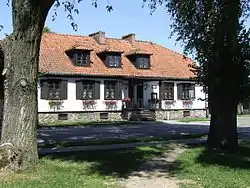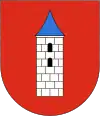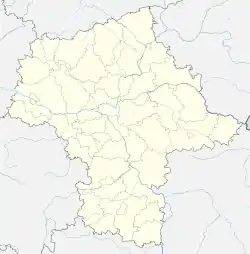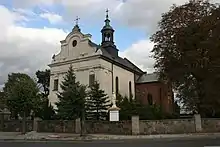Bieżuń
Bieżuń [ˈbʲɛʐuɲ] is a town in Żuromin County, Masovian Voivodeship, Poland, with 1,903 inhabitants (2004) on the Wkra River.
Bieżuń | |
|---|---|
 Museum | |
 Coat of arms | |
 Bieżuń  Bieżuń | |
| Coordinates: 52°57′N 19°53′E | |
| Country | |
| Voivodeship | Masovian |
| County | Żuromin |
| Gmina | Bieżuń |
| Town rights | 1409-1869, 1994 |
| Government | |
| • Mayor | Andrzej Szymański |
| Area | |
| • Total | 12.07 km2 (4.66 sq mi) |
| Population (30.06.2016) | |
| • Total | 1,910[1] |
| Time zone | UTC+1 (CET) |
| • Summer (DST) | UTC+2 (CEST) |
| Postal code | 09-320 |
| Area code(s) | +48 23 |
| Car plates | WZU |
| Website | http://www.biezun.pl |
History

Jędrzej of Golczew, castellan of Płock, established the town at the end of the 14th century. Duke Siemowit IV of Masovia granted the city rights charter in 1406 and in 1869, during Russia's occupation, the town lost its city rights until 1994. Bieżuń was a private town, administratively located in the Płock Voivodeship in the Greater Poland Province of the Polish Crown. Prior to the Deluge the town was famous and had a strong castle, but it was destroyed during that war. Polish Crown Chancellor Andrzej Zamoyski was born there and lived in the palace he built while working on his code of civil laws known as Zbiór praw sądowych. During Zamojski's residency there, in 1767, Polish–Lithuanian Commonwealth king Stanisław August Poniatowski granted the renewal of the town charter under the Magdeburg rights.
After the Third Partition of Poland the town fell into the Prussia's domain, then during the War of the Fourth Coalition there was a small pitched battle between the Napoleonic troops and the Prussians, known as the Battle of Bieżuń, a French victory that took place on December 21–23, 1806. Between 1807-15 it was part of the Polish Duchy of Warsaw, then under the Russian dominion until 1918, when Poland regained independence. During the Polish–Soviet War, the Soviets invaded the town on 22 August 1920, and then briefly occupied it.[2] Following the joint German-Soviet invasion of Poland, which started World War II in September 1939, the town was occupied by Germany until 1945. In 1942, the occupiers expelled around 100 Poles from the town.[3] Expelled Poles were initially held in a camp in Działdowo and then deported to the Kraków District of the General Government in German-occupied southern Poland, while their houses were handed over to German colonists as part of the Lebensraum policy.[3]
Notable people
- Jerzy Bończak (born 1949), Polish actor
References
- http://www.polskawliczbach.pl/Biezun, w oparciu o dane GUS.
- Krajewski, Mirosław (2010). Ziemia dobrzyńska w cieniu Czerwonej Gwiazdy. Rok 1920 (in Polish). Rypin: Wszechnica Edukacyjna i Wydawnicza Verbum. p. 22. ISBN 978-83-88701-41-2.
- Wardzyńska, Maria (2017). Wysiedlenia ludności polskiej z okupowanych ziem polskich włączonych do III Rzeszy w latach 1939-1945 (in Polish). Warszawa: IPN. p. 421. ISBN 978-83-8098-174-4.
- "Wkra Bieżuń - strona klubu" (in Polish). Retrieved 30 January 2021.